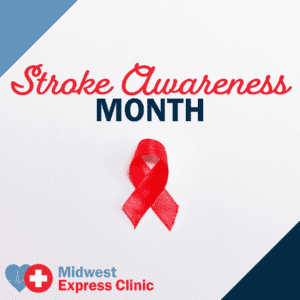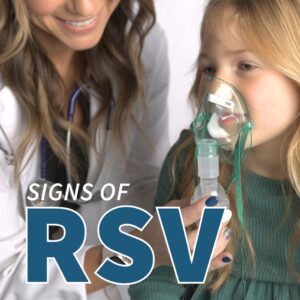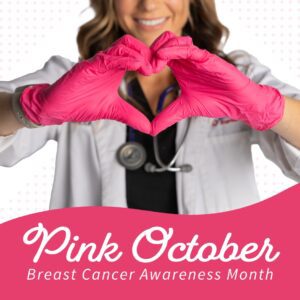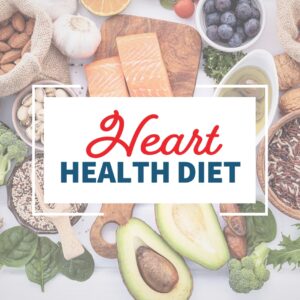Understanding Strokes: Signs, Symptoms and Prevention of this Serious Health Event
 According to the Centers for Disease Control and Prevention, someone in the United States has a stroke every 40 seconds. Although they are more common in older folks, a person can experience a stroke at any age.
According to the Centers for Disease Control and Prevention, someone in the United States has a stroke every 40 seconds. Although they are more common in older folks, a person can experience a stroke at any age.
May is Stroke Awareness month, and as your partner in all things health related, our experts at Midwest Express Clinic want to educate our patients about this serious health event. The more you know about strokes, the better prepared you are to prevent them and take action if one occurs to you or a loved one.
What happens in the body during a stroke
A stroke occurs when blood flow to the brain is interrupted. The affected parts of the brain and brain cells that do not receive the necessary blood and oxygen begin to die. This can lead to short-term or permeant loss of certain functions of the body.
There are three types of strokes:
Ischemic stroke: A clot obstructs blood flow to the brain.
Hemorrhagic stroke: A blood vessel ruptures and prevents blood flow to the brain.
Transient ischemic attack: Also known as a “mini stroke,” is caused by a temporary clot.
Signs someone is having a stroke
Receiving medical assistance quickly is key to diminishing the damage of a stroke. Patients who receive care within three hours of their first symptoms often have less disability three months after a stroke than those whose care was delayed.
Symptoms of a stroke:
- Sudden loss of balance or coordination that makes it difficult to walk.
- A severe headache that seems to come from nowhere and that may be accompanied by vomiting or dizziness.
- Abrupt blurred or lost vision in one or both eyes.
- Difficulty speaking, such as slurring words and sudden confusion or problems understanding the speech of others.
- A sudden numbness or paralysis of the face, arm or leg, often affecting only one side of the body.
The acronym FAST will help you identify these signs and symptoms in others:
- Face: Have the person smile at you to check for signs of one side drooping.
- Arms: Ask the person to raise both of their arms. Watch for one side drifting downward or not rising at all.
- Speech: Request the person repeat a simple phrase and check for slurred or strange speech.
- Time: Every minute counts during a stroke event. Call 911 for emergency medical help immediately if you see someone displaying any of these signs. Do not wait to see if the symptoms stop.
Tips for prevention
80% of strokes are preventable through lifestyle changes and medicine. Maintaining an active lifestyle along with a balanced diet low in saturated fats, trans fats, cholesterol and sodium, but high in fiber, can help reduce risk factors such as high cholesterol levels, high blood pressure and obesity. Avoiding smoking cigarettes or being exposed to second-hand cigarette smoke as well as limiting alcohol intake can also reduce the chances of having a stroke.
Midwest Express Clinic can help manage your risk factors
The team at Midwest Express Clinic is here to help you and your family get on track with a healthy lifestyle to reduce your risk of experiencing a stroke. We can provide screenings for certain risk factors like high cholesterol and blood pressure, as well as advise you on how to lose weight or quit smoking. Check in online at one of our convenient locations today!




